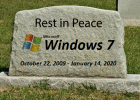
As a computer tech of 21+ years, I am often asked by my friends, acquaintances, fellow church members, etc. for computer advice.
Since the “window of opportunity” to upgrade your desktop or laptop PC to Windows 10 for free* will soon be drawing to a close, I wanted to address the question which, lately, I am being asked most often:
Should I upgrade my computer to Windows 10?
If you own a PC desktop or laptop running Windows 7 or 8.1, you are most likely eligible for a free upgrade to Windows 10. In fact, the chances are, you have been seeing the little ad popping up about it in the lower right-hand corner of your screen, coming from this little icon in your system tray:
![]()
If you right-click on that icon, you’ll get this list of options:
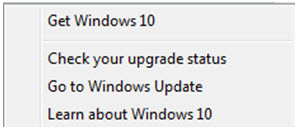
If you just click on the icon, you get this window:
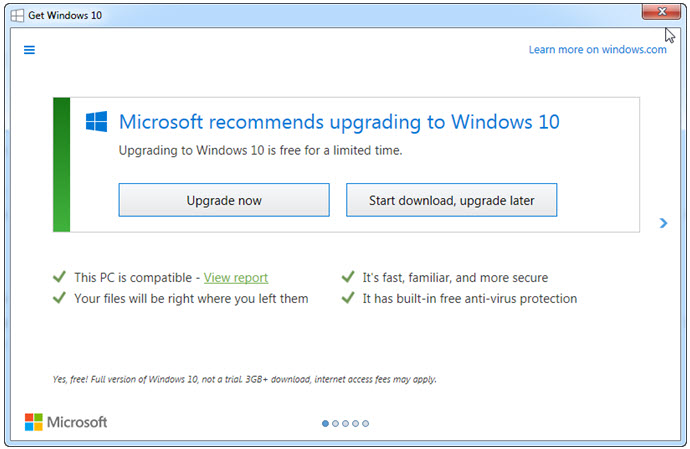
There are a few things to consider before you decide to jump headlong into Windows 10. I’ll frame them in the form of questions, list them, and answer them one by one.
- Is the upgrade to Windows 10 necessary?
- Is it really important to upgrade? If so, why?
- Are there risks involved in upgrading?
- Will my computer perform better under Windows 10?
- Will my documents, pictures, music, and data survive the upgrade?
- Will I have to learn a lot of new things to use Windows 10?
- Will I lose any functionality going from Windows 7 or 8.1 to 10?
- Will I like Windows 10?
Let’s begin with the first one. Is the upgrade necessary?
Someone has said, “There are two kinds of people: those who think there are two kinds of people and those who don’t.” “Necessary” is often in the eye of the beholder. Generally speaking, if you have Windows 7 and are used to it, and happy with it, and are unlikely to continue using your current computer past April of 2020, you may just want to stay with what you’ve got and not upgrade at all.
Microsoft has committed to maintain extended Windows 7 support until April, 2020. That means they will continue to release Windows Updates for it until that date. Windows 7 has been the most successful, best received version of Windows since Windows XP, and many users are afraid to part with a version of Windows that they finally love.
If you have Windows 8 or 8.1, that’s another story. Generally speaking, the public didn’t take to this “total makeover” of Windows, finding it non-intuitive, completely different from previous versions, and ridiculously difficult – requiring them to go back to square one and learn a whole new operating system. Few people want a repeat of that kind of traumatic change. Be assured that Windows 10 is a step back to sanity from Windows 8. Windows 10 is like Windows 7 with the best of Windows 8 added in.
But Microsoft has “retired” Windows 8 and 8.1. They will no longer be issuing patches to security vulnerabilities in the form of Windows Updates for version 8, and that makes it imperative that you upgrade to 10 if you have that version. If you have Windows 8.0, you first have to upgrade to Windows 8.1 (this is a free upgrade) before you can upgrade to Windows 10.
Second question. Is it important to upgrade? If so, why?
As I pointed out above, Windows 7 isn’t going anywhere for a while. But you may want to consider upgrading for any of several reasons:
- In the world of computer software, it is always a good idea to stay current. This helps insure optimum security, gives you the benefit of the most advanced functionality, and tends to provide the best overall user experience, generally
- For a recent PC that may run for several more years, it increases the longevity and will keep the computer relevant and current, software-wise (of course, hardware may be a different story…)
- Windows 10 is, according to Microsoft, the last Windows operating system. Instead of releasing a new Windows every 3 years, they will simply use online upgrades to improve it, increase security, or enhance functionality
- Windows 10 includes access to an App Store, which allows you to acquire or purchase (some are free, some are not) Windows 10 apps, widgets, gadgets, and the like, to provide additional productivity or entertainment functionality. Generally speaking, they are very inexpensive
- The most recent operating system always runs the most recent software best. And Windows 10 includes some nice features, which many users will find helpful and enjoy. It starts up a LOT faster, for one thing
Third question. Are there risks involved in upgrading?
Absolutely.
- The upgrade could bomb out, and you could be left dealing with lost data and having to reinstall the operating system and all the software. It doesn’t happen often, but it does happen. If you upgrade, be sure to back up everything before you do
- If you have an older computer, it may not run Windows 10 as well as it runs Windows 7 or 8.1
- Your older hardware may not be up to the task of running Windows 10
- You may complete the upgrade just fine, and then you may simply not like the new version
- There are probably others I haven’t thought of
Fourth question. Will my computer perform better under Windows 10?
That depends. If you have an older system with a single-core or dual-core processor, maybe not. In fact, I would strongly advise against upgrading any system with a single-core processor. Some systems will support a processor upgrade, but that can be expensive, so you’ll need to weigh that against the option of just buying a new computer (which, these days, can be surprisingly inexpensive.)
If you have a faster dual-core or better (3, 4, 6, or 8 cores) processor, Windows 10 should run great on your system, and be very smooth and fast.
Fifth question. Will my documents, pictures, music, and data survive the upgrade?
Microsoft has designed the upgrade to be relatively fast, easy, and painless. Ideally, you should come through it with all your data intact. But, with any computer upgrade operation, the outcome is never guaranteed. BE SURE you have everything backed up.
My personal experience so far, in upgrading several systems, has been a smooth and problem-free upgrade resulting in a great running system.
Sixth question. Will I have to learn a lot of new things to use Windows 10?
Not too many really. Windows 10 brought back the Start button, to everyone’s relief and approval. But things are organized a little differently. It also added a panel of tiles (similar to Windows 8) to the Start Menu. You can customize that or even do away with it, depending on your personal preferences.
Right-clicking the Start button produces a long list of options, and access to things like Control Panel, Search, Run, and any number of things you won’t find just by clicking on start:
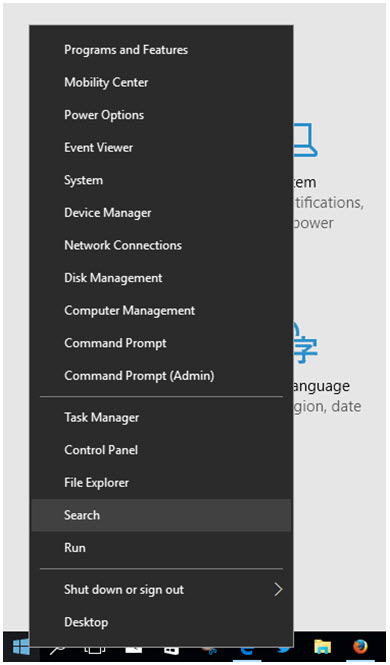
You can still have icons out on the Desktop, if you prefer, or find less obvious applications from the start menu under All Apps.
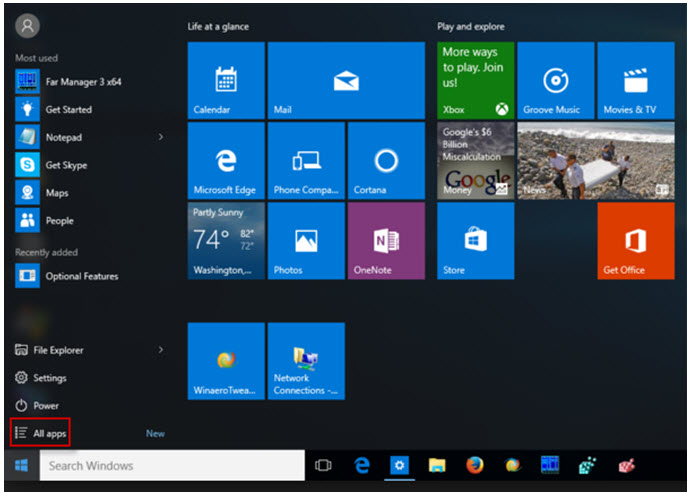
Question 7. Will I lose any functionality going from Windows 7 or 8.1 to 10?
Yes there are a few things that are deprecated (that’s the official term) in Windows 10. These include:
- Windows Media Center
- The software to play DVD videos (a good alternative for this is VLC)
- Desktop Gadgets
- Solitaire, Minesweeper, and Hearts (though you can get some of these through the App Store
- The ability to exercise any control over Windows Updates
Question 8. Will I like Windows 10?
Generally speaking, the public’s reception of Windows 10 has been very favorable.
That said, will YOU like it? Nobody but you will know the answer to that.
If you know somebody who is using Windows 10, it might be a really good idea to try it out, if they will let you, and SEE if you like it.
I hope this article has provided you with some food for thought regarding the pros and cons of upgrading to Windows 10. In a future post, I will discuss using Windows 10 for those who are unfamiliar with it.
